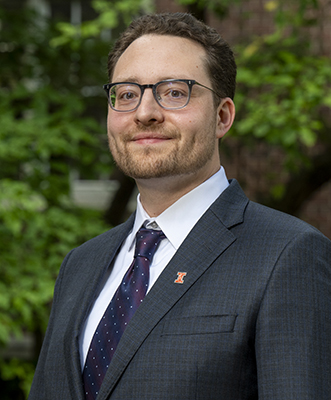
Oct 3, 2024 Business Administration Faculty Research in Education
Nelson: "I formed my love for Illinois at an early age"
Dylan K. Nelson, who studies sources of shared value in employment relationships, was drawn during graduate school to Gies faculty’s research on corporate governance and organizational change.
“Gies was on the top of my list as a place where you can do top-level research in a community of people that are invested in linking questions of performance and productivity, to questions of purpose, worker experience, and workers’ job mobility,” said Nelson, who joined the College this summer as an assistant professor of business administration. “I was also drawn to the ability to access Gies’ census data center – there are only about 30 of them in the country. This allows me to work in person with Gies colleagues using restricted-access government data on businesses and careers.”

For Nelson, returning to Champaign is a homecoming. His mom, Teresa Nelson, earned her PhD in Strategy from Gies College of Business in the 1990s. He lived in nearby Savoy and fondly remembers birthday parties at orchards, the roller rink, and the YMCA.
“I followed in her footsteps and formed my love for the University of Illinois at an early age -- I’m excited to be back,” Nelson said.
Nelson will be teaching BADM 313: Strategic Human Resource Management, focusing on the bigger picture of how to link employee’s hearts and minds to organizational objectives, and how this engagement is shaped by broader outside forces such as industrial competition, social movements, and regulation.
“I’m excited to be teaching students who are passionate about business and questions of purpose at a time when there is more fluidity of ownership and a rapid change in the tasks making up many popular jobs,” Nelson said. “Given that companies don’t have unlimited resources, how should they distribute them? How do they manage different expectations of workers and other stakeholders?”
Nelson added that worker compensation is no longer solely about trading money for effort. His research shows that there is increasingly a component of building a relationship with commitments and gained experience.
“It becomes about predicting how the pieces of the puzzle fit together,” said Nelson, who took courses in organizational dynamics while earning an undergraduate degree from Brown University, graduating with a concentration in music. During that time, he also worked for a startup company focused on commercializing audio-based algorithms.
Nelson then attended the London School of Economics on a full scholarship from Rotary International, earning a master’s degree in political sociology in 2013. His thesis centered on the rise of large multi-state corporations in the 19th century, and how the US government sought to "catch up" to this novel organizational form.
Nelson earned a master’s degree in statistics and a PhD in sociology, specializing in economic sociology and organizations from the University of Michigan in 2022. His dissertation examined how corporate reorganization impacts worker productivity and well-being, and his work more broadly focused on how different forms of organizational structure and management practices create career opportunities for workers.
“I focused on private equity and traced what happens to individual workers when a company is bought out and how it shapes their careers and earning outcomes,” said Nelson, reflecting on the savior and raider roles that have defined private equity firms over the years.
Nelson said his research promotes the idea that there is heterogeneity in private equity buyouts. Some deals reduce worker outcomes, but less than what initially appears when controlling for the financial position of the type of companies they buy. Then there is a large set of deals focused on building up companies, and these actually improve worker outcomes.
“For example, the data showed that troubled company buyouts lead to more job loss and more stagnant earnings,” Nelson said. “When a company is in a crisis they reorganize and reduce their implicit commitments to workers. But when stronger performing companies are bought out, you don’t see the same type of negative effects, actually the reverse.”
While this work focused on buyouts of large, public firms, Nelson is increasingly interested in studying the buyouts of smaller, private companies that now dominate this space. Nelson’s post-doctoral work at MIT Sloan School of Management centered on topics related to company reorganization, management practices and worker outcomes.
“Building off my dissertation work, we studied how organizational structure and management practices impact people’s careers and their mobility within and between organizations over time,” said Nelson about the paper “Work Organization and High-paying Jobs.”
“It answers the questions of how and with what effectiveness we can give frontline workers the chance to improve their earnings and become more valuable to the company,” he said. “We found that autonomy, even when controlling for technical skills that can be learned on and off the job, is associated with pay boosts for frontline workers. We are continuing our work to unpack different channels, including productivity, difficulty of monitoring, and the countervailing impact of worker’s willingness to tradeoff autonomy for pay.”
Throughout his dissertation and postdoc research, Nelson has used restricted-access Census and IRS data covering all US businesses and about 150 million workers (all workers in a random sample of 24 states over the last three decades.
Nelson is currently developing new work using this data to continue his research on ownership, management practices, and worker careers. “I’m looking forward to getting this work published and beginning new projects with my new colleagues at Gies and beyond,” he said.
